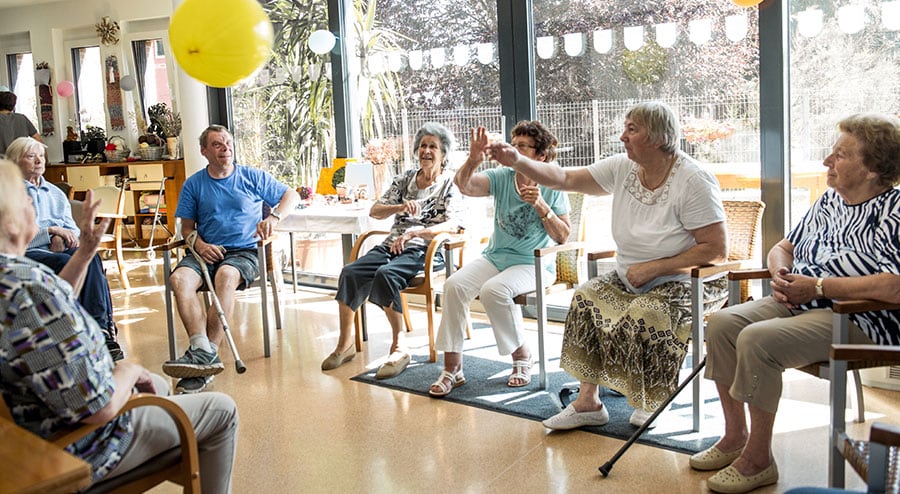Explore specialized Memory Care facilities designed for cognitive health.
Discovering the Right Assisted Living Service for Tailored Memory Care Programs
The procedure of picking an appropriate assisted living service for tailored memory care programs calls for a nuanced understanding of private requirements, especially as they connect to cognitive impairments such as Alzheimer's and dementia. As we explore these aspects, the question stays: what genuinely constitutes an optimal setting for memory treatment?
Comprehending Memory Care Needs
Recognizing the unique memory care requirements of people with cognitive disabilities is important for offering effective support and improving quality of life. Cognitive impairments, consisting of Alzheimer's condition and other kinds of dementia, substantially influence a person's capacity to procedure info, connect, and keep self-reliance. Consequently, tailored strategies are essential in attending to these difficulties.
People with memory problems frequently experience complication, mood variations, and disorientation, necessitating a helpful and organized setting. Memory care programs should focus on producing a safe room that urges social interaction, cognitive interaction, and psychological wellness. This can be achieved with specialized tasks, such as memory games, art therapy, and reminiscence sessions, which promote cognitive excitement and maintain individual identity.

Reviewing Staff Certifications
The certifications of personnel participants in memory treatment programs are critical to delivering premium support for individuals with cognitive disabilities. Reviewing personnel qualifications involves assessing both educational history and functional experience in senior citizen care, particularly in memory-related problems such as Alzheimer's and various other types of mental deterioration.
Seek staff who have appropriate certifications, such as Licensed Mental Deterioration Expert (CDP) or specialized training in memory treatment. These credentials suggest a dedication to understanding the complexities of cognitive decrease and reliable interaction techniques customized to residents' one-of-a-kind needs. In addition, inquire concerning continuous training possibilities that personnel join, as constant education and learning is essential in an area that evolves swiftly with new study and ideal practices.
Furthermore, examine the staff-to-resident ratio, as this directly influences the high quality of treatment. A lower ratio enables more personalized interest and engagement with homeowners. Observe staff interactions with current residents to determine their compassion, patience, and capability to connect. Ultimately, a professional team is critical in fostering a setting that boosts the self-respect and lifestyle for individuals in memory treatment.
Relevance of Personalized Care Program
Personalized care plans play an essential role in boosting the well-being of individuals in memory treatment programs. These plans are tailored to the special needs, choices, and abilities of each resident, guaranteeing that treatment is both pertinent and efficient. By considering factors such as clinical history, cognitive function, and personal passions, caregivers can create a thorough technique that advertises self-respect and regard for each individual.
The value of individualized care strategies prolongs past standard care demands; they promote a complacency and familiarity, which is vital for people experiencing memory difficulties. By attending to specific behavioral patterns and emotional actions, caregivers can carry out techniques that decrease stress and anxiety and improve total lifestyle.
Moreover, customized treatment plans facilitate better communication amongst staff, member of the family, and doctor. This collective strategy makes certain that everybody included is notified and lined up in their treatment initiatives, leading to even more constant and reliable support. Eventually, a well-structured tailored treatment plan is essential in memory care programs, as it not only improves day-to-day living experiences but likewise adds to the lasting health and wellness and joy of residents.
Involving Tasks and Programs

Activities such as art treatment, songs sessions, and reminiscence treatment supply opportunities for self-expression and cognitive engagement. These deliberate interactions not just help in preserving cognitive capacities but likewise offer psychological benefits, reducing sensations of seclusion and anxiety published here that typically accompany memory loss.
Furthermore, structured group tasks can motivate socializing, which is crucial for emotional health - Assisted Living. Routine involvement in video games, workout classes, and area trips produces an environment of friendship and assistance. Tailored programs that consider private passions and histories even more improve involvement, making activities a lot more significant and reliable
Incorporating innovation, such as memory video games and online truth experiences, can also offer to enrich the day-to-days live of locals, providing ingenious means to promote cognitive function. Ultimately, a concentrate on interesting activities and programs is important for cultivating a helpful environment that promotes holistic well-being in memory care settings.

Assessing Area Setting
When examining a community environment for memory treatment programs, it is important to consider factors that add to the overall wellness and safety of citizens. The physical format of the area ought to prioritize accessibility and navigation, reducing challenges while providing clear signs and acquainted spots. A protected atmosphere is essential to prevent homeowners from wandering, which can position safety and security threats.
Additionally, the sensory elements of the neighborhood, such as lighting, color design, and noise levels, play a considerable duty in enhancing comfort and lowering anxiousness amongst homeowners. All-natural light and outdoor rooms promote interaction with nature, promoting a calming ambience that can profit cognitive function.
Another essential aspect is the schedule of experienced personnel that understand the one-of-a-kind demands of people with memory impairments. Staff must be geared up to develop a nurturing atmosphere that encourages social interaction and emotional support.
Lastly, the sense of neighborhood and belonging is important. Involving family members participation and possibilities for locals to form links with peers can substantially boost their overall top quality of life. Memory Care. By carefully evaluating these aspects, households can make educated choices concerning the most suitable memory care neighborhood for their loved ones
Verdict
To conclude, choosing an appropriate assisted living remedy for customized memory treatment programs necessitates an extensive evaluation of private needs and preferences. Prioritizing staff credentials, individualized care plans, engaging activities, and a helpful community setting is necessary for improving the lifestyle for residents facing cognitive challenges. By attending to these essential factors, family members can make certain that their loved ones get the necessary support and treatment to promote emotional wellness and cognitive stimulation in a nurturing setting.